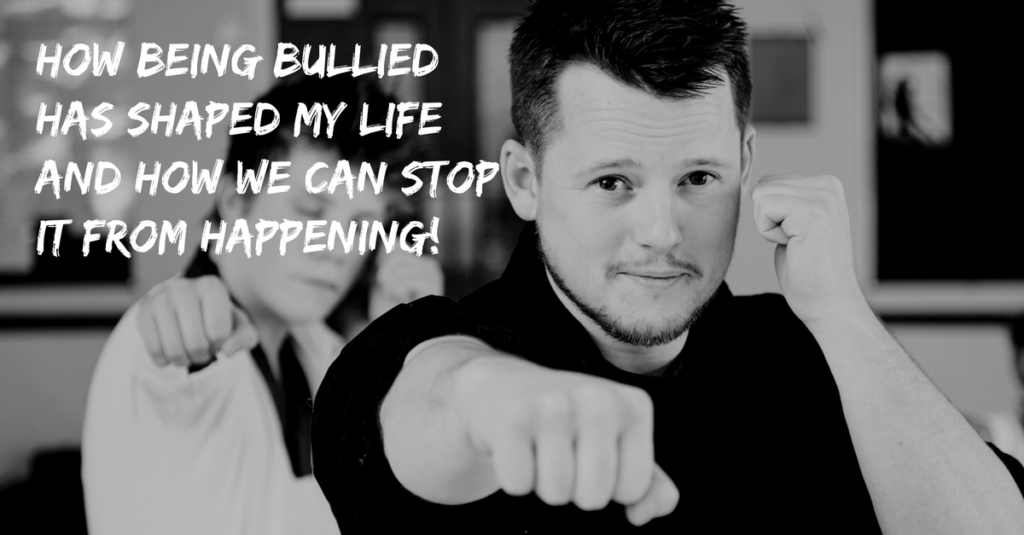
From the age of 7 until 11 I was bullied terribly in school.
This came from changing schools and being “the new kid” in a very small class where there was already a tight knit community established. I was nervous about changing schools and no doubt this became visible, as, with a lot of bullying, in this position I was an easy target. I was targeted before school, during break time and after school, sat alone during lunch. I was bullied physically but worse by far was the psychological bullying that occured, cleverly out of sight from teachers and parents.
My confidence was shattered, I lived in a rural town with few other neighbours and friends and very little to look forward to each day as I went to school. My only solace was my martial arts club. I was part of a community where each child referred to each other as sir/mam, where courtesy and respect were held as high values and developing a Black Belt / Positive mindset was the norm. A tremendous amount of power came from the support I felt from this community, I was able to speak freely about what I was going through, see the same friendly faces each day and have one on one mentoring with an excellent instructor who provided me with the strength of Character I needed to eventually overcome bullying.
Towards the end of this 4 year ordeal, my confidence had grown from being part of such a strong community, I had a strong sense of self worth and was equipped with a newly developed moral compass, I simply couldn’t stand the injustice and I developed the courage to stand up to the main aggressors. It took a tremendous amount of courage for me to stand up and hold my ground and resulted in a physical confrontation., again, something martial arts provided me with the confidence to use, effectively, resulting in an immediate shift in the pecking order in school.
I tell my students every week that courage earns confidence… but where do we find courage?
I believe courage is fostered from a strong community that develops mindset, resilience and has a foundation of emotional support.
Bullying is something so many of us go through and I believe it has tremendous power (like any challenge or negative situation) to make or break us. We can emerge stronger than ever before with thicker skin, resilience and a concept of self worth, or we can emerge beaten and broken psychological,with a destroyed self esteem and problems with developing trust which can affect our relationships in future life, the decisions we make and can result in an unfulfilled life.
Although there are some excellent campaigns to prevent bullying from occurring or stop it from continuing now days, it’s still a largely debated topic that is hard to solve on a national scale. Bullying is likely to happen to each of us as adults or children, and it’s imperative that we ensure our child is part of a community that bulletproofs them from being a victim of bullying but also prevents them from becoming a bully themselves.
So, how can a club or organisation deal with instances of bullying, prevent it from happening and bulletproof children from being bullied?
To stop bullying we need to understand bullying and we need to know why it occurs and where it comes from.
Unfortunately, bullying occurs naturally in all of our communities, it’s been going on for thousands of years, what’s interesting is that bullying is remarkably simple. In almost all cases, bullying is “dominance behaviour”, and this behaviour typically results because one more more aspects are missing.
Typically a Bully is lacking attention at home and they react by lashing out at others for attention. Bullying can often be a learnt behaviour at home, where parents handle conflict poorly, show aggressive behaviour or are angry.
A study by “Stomp Out Bullying” showed that bullies don’t need a reason to hurt others. When asked, some replied:
Because it makes me feel stronger, smarter, or better than the person I’m bullying
Because I’m bullied at home
Because it’s what you do if you want to hang out with the right crowd
Because I see others doing it
Because I’m jealous of the other person
Because it’s one of the best ways to keep others from bullying me
Look closely at the above reasons as to why a bully would have displayed their behaviour. The majority of the problems above occur from a negative peer group or lack of confidence. By being outwardly positive to your peers you raise up your peer group and develop their confidence. You also improve the peer group in general so the members feel more positive attention.
Our 2 step method to dealing with bullies in our organisation:
1) Discovering what’s missing and filling in the gaps, replacing the negative with positive and ensuring this is reinforced regularly. Modifying the learned behaviour built up from being part of a negative community.
2) Surrounding the bully in a positive community where they feel welcome, at home and free to be creative and happy … without fear of being bullied themselves. As we know bullying often stems from fear, eliminating this fear has a strong impact on preventing bullying in itself.
We have spotted bully’s in the past and transformed them into the biggest advocates for anti-bullying as they begin to learn about the result of their actions. Instead, their evident power of influence can be used for good and can be geared towards building up their friends.
Bullying is a learned behaviour but it can also be unlearned. Find and fill the gaps and surround yourself and your child with the right community.
I hope you enjoyed this Blog! On the next blog we will be talking about one of the most difficult transitions young people go through and how your child’s community can help them!

